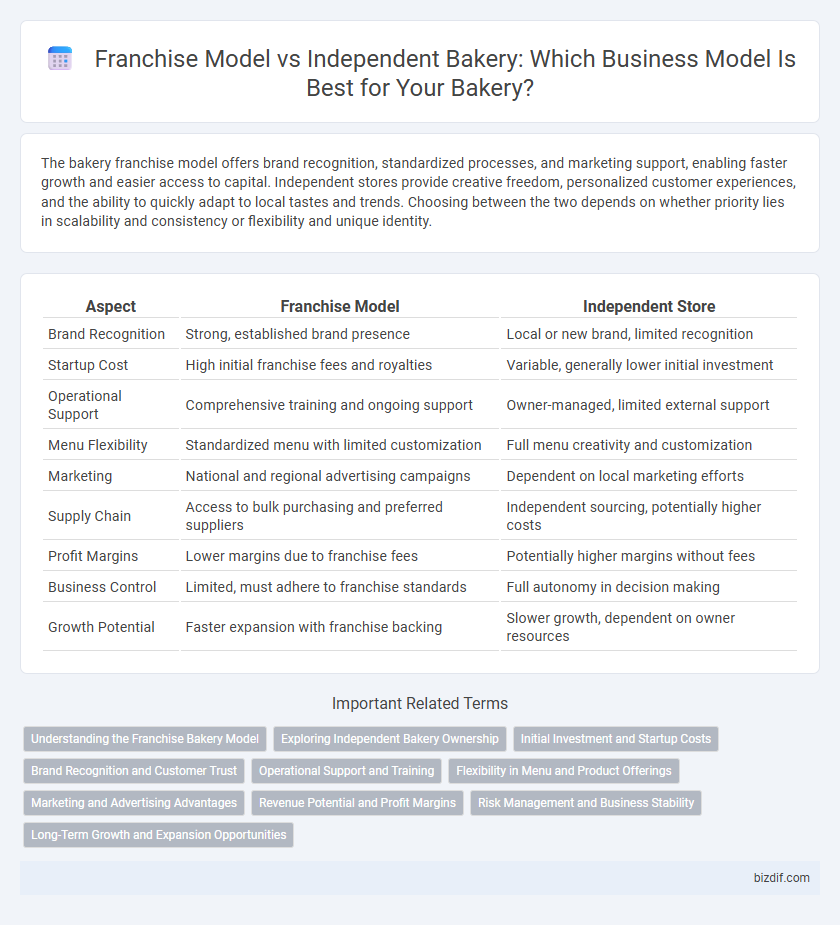The bakery franchise model offers brand recognition, standardized processes, and marketing support, enabling faster growth and easier access to capital. Independent stores provide creative freedom, personalized customer experiences, and the ability to quickly adapt to local tastes and trends. Choosing between the two depends on whether priority lies in scalability and consistency or flexibility and unique identity.
Table of Comparison
| Aspect | Franchise Model | Independent Store |
|---|---|---|
| Brand Recognition | Strong, established brand presence | Local or new brand, limited recognition |
| Startup Cost | High initial franchise fees and royalties | Variable, generally lower initial investment |
| Operational Support | Comprehensive training and ongoing support | Owner-managed, limited external support |
| Menu Flexibility | Standardized menu with limited customization | Full menu creativity and customization |
| Marketing | National and regional advertising campaigns | Dependent on local marketing efforts |
| Supply Chain | Access to bulk purchasing and preferred suppliers | Independent sourcing, potentially higher costs |
| Profit Margins | Lower margins due to franchise fees | Potentially higher margins without fees |
| Business Control | Limited, must adhere to franchise standards | Full autonomy in decision making |
| Growth Potential | Faster expansion with franchise backing | Slower growth, dependent on owner resources |
Understanding the Franchise Bakery Model
The franchise bakery model offers standardized recipes, branding, and operational support, enabling consistent product quality and customer experience across locations. Franchisees benefit from established supply chains and marketing strategies, reducing the risks associated with starting a bakery independently. Understanding these advantages helps entrepreneurs evaluate the trade-offs between autonomy in independent stores and the structured growth potential of franchise bakeries.
Exploring Independent Bakery Ownership
Independent bakery ownership offers complete creative control over recipes, branding, and customer experience, enabling unique product differentiation in a competitive market. Entrepreneurs avoid franchise fees and mandatory supply chains, resulting in higher profit margins and operational flexibility. However, independent owners face challenges like building brand recognition and managing all business aspects without corporate support.
Initial Investment and Startup Costs
Franchise bakery models typically require higher initial investment due to franchise fees, royalty payments, and mandated equipment or design standards, often ranging from $200,000 to $500,000. Independent bakery startups offer greater flexibility with lower startup costs, which can vary widely from $50,000 to $150,000, depending on location and scale. Understanding the balance between franchising's structured support and independence's cost-effectiveness is critical for new bakery entrepreneurs.
Brand Recognition and Customer Trust
Franchise bakeries benefit from established brand recognition, driving customer trust and consistent foot traffic through proven operational standards and marketing power. Independent stores face challenges in building brand awareness but have the flexibility to create unique, localized customer experiences that foster loyalty. Brand recognition in franchise models often leads to quicker market penetration, while independent bakeries rely on quality and community engagement to cultivate trust over time.
Operational Support and Training
Franchise bakery models offer comprehensive operational support and standardized training programs, ensuring consistency and efficiency across locations. Independent bakeries must develop their own training methods and support systems, which can lead to varied quality and operational challenges. Access to proprietary recipes, supply chain assistance, and marketing strategies are key benefits in franchise operations compared to independent stores.
Flexibility in Menu and Product Offerings
Franchise bakery models typically follow a standardized menu and product offerings to maintain brand consistency, limiting flexibility for customization. Independent bakeries have greater freedom to innovate and adapt their menu based on local customer preferences and seasonal ingredients. This flexibility allows independent stores to test unique recipes and quickly respond to market trends, fostering a more dynamic product selection.
Marketing and Advertising Advantages
Franchise bakeries benefit from established brand recognition and national advertising campaigns that attract a large customer base quickly, reducing individual marketing costs. Independent stores have flexibility to tailor marketing strategies to local tastes and trends, creating personalized community engagement but often face higher per-unit advertising expenses. Investment in digital marketing and social media outreach is crucial for independent bakeries to compete with the franchise model's broad promotional reach.
Revenue Potential and Profit Margins
Franchise bakery models often provide higher revenue potential through established brand recognition and proven operational systems, attracting a steady customer base from the outset. Independent bakeries can achieve greater profit margins by controlling all aspects of production and supply chains, allowing for customization and cost optimization. However, franchise fees and royalty payments reduce net profits, whereas independent stores retain full earnings but face greater market entry risks.
Risk Management and Business Stability
Franchise bakery models offer risk management advantages through established brand reputation, standardized operating procedures, and ongoing corporate support, which enhance business stability and reduce market entry uncertainties. Independent bakeries face higher risks due to reliance on local reputation and self-driven marketing but benefit from greater operational control and flexibility. Effective risk management in franchises hinges on adherence to proven systems, while independents must innovate continuously to maintain stability and respond to market fluctuations.
Long-Term Growth and Expansion Opportunities
Franchise bakery models offer faster long-term growth through established brand recognition, proven operational systems, and access to collective marketing resources. Independent stores face slower scalability but maintain full control over product innovation and localized customer engagement, which can foster strong community loyalty. Expansion opportunities are more predictable in franchises due to standardized processes, whereas independents rely on unique market positioning and organic growth strategies.
Franchise Model vs Independent Store Infographic

 bizdif.com
bizdif.com